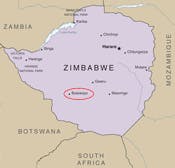Zimbabwe's second largest city of Bulawayo says it will soon limit water supplies to residents to only once every 11 days as water shortages reach desperate levels in the city of more than one million people.
Bulawayo city council spokesman Phathisa Nyathi told ZimOnline that water cuts could last for even longer periods later in October, ironically the country's hottest month when demand for water is at its highest.
"Residents will soon be getting water once in every eleven days but already there are some suburbs that are on higher ground that have been getting water once in every two weeks," said Nyathi.
Bulawayo, the hub of economic activity in the southern half of the country, consumes 150,000 cubic metres of water per day but has been pumping only 69,000 cubic metres per day after decommissioning three supply dams due to low water levels. The city will decommission yet another dam in late October to leave it dependent on only one dam and some boreholes sunk across the city.
Bulawayo, tucked at the heart of the dry Matabeleland region, was this week hit by an outbreak of diarrhoea and dysentery as residents resorted to drinking untreated water.
The outbreak has left more than 400 people hospitalized, while health experts warn of a possible outbreak of more diseases such as cholera and typhoid as more and more of the city's residents resort to unprotected wells for water while also using bushy areas to relieve themselves because toilets cannot work without water.
But some residents who have boreholes at their premises have been quick to exploit the water crisis to make money, selling water to fellow residents who do not have boreholes.
Maria Ncube, who is employed as till operator at one of Bulawayo's leading supermarket chains says she pays Z$30 000 for a 20-litre bucket of borehole water.
Residents have been banned from watering gardens or washing cars, while some families say they are now doing laundry once in every two weeks to save on water.
"I wash my husband's overalls once every two weeks while I have had to buy several pairs of uniforms for the kids so they can go for more days before they need to be washed," said Rose Ngwenya, a mother of three from Bulawayo's Mpopoma low income suburb.
Zimbabwe's second city has faced perennial water problems for more than two decades during which both residents and the city fathers have pinned their hopes on an ambitious project to draw water from the Zambezi River.
The Matabeleland Zambezi Water Project, a long held plan to tap water from the Zambezi River through the construction of a 450km pipeline to arid Matabeleland was mooted way back in 1912.
Costs have since ballooned to about US$600 million, way beyond what the cash-strapped Zimbabwe government can afford.
Source: BBC Monitoring Africa


